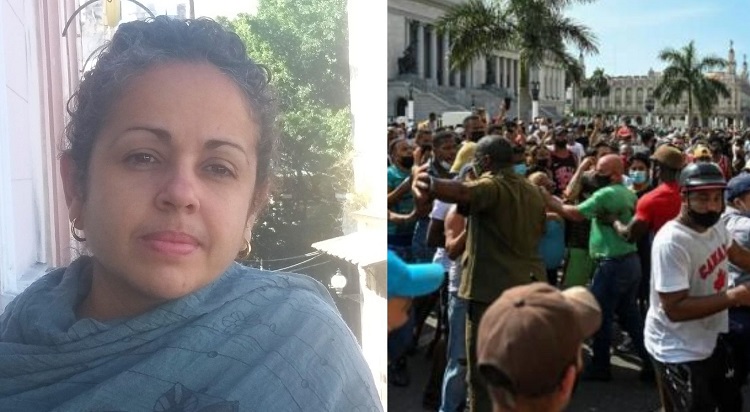MEXICO CITY, Mexico.- Ana Leoncolumnist for CubaNet, cannot leave Cuba from May 2018. An immigration regulation for “reasons of public interest” weighs on her, a term used by state agents to arbitrarily restrict the mobility of journalists and human rights defenders.
In the last four years, Anay Remón, who is the real name of Ana León, and her family have suffered intermittent harassment by the Cuban political police. She is threatened for writing opinion articles in an independent media outlet. Her mother is terrified that her daughter will go to prison. But Anay has decided to denounce every repressive act against her and continue writing.
He did just that on July 11, 2021 (J11), when more than sixty towns took to the streets to protest. She was there, in Centro Habana. A year later she tells how she lived it.
―How do you remember 11J?
It dawned like any other Sunday, very boring. I remember I was browsing social media to kill the tedium. He had been at it for a while when the broadcast of the protest in San Antonio de los Baños came on. It was a little past noon. I was amazed to see so many people shouting “Freedom” and “We are not afraid”. It was the whole town protesting. Then the images of the demonstrations in Palma Soriano also began to enter, after Cárdenas and Camagüey.
Just then I felt the run run in my building. I picked up the phone and went out. People were crammed into balconies all over the block, and down Belascoaín Street a crowd ran with a Cuban flag and various banners shouting: “Freedom, “Down with the dictatorship” and “Díaz-Canel singao.” I went down. I was very impressed to see so many people expressing their rejection of the government. From the balconies, the elderly, and people who could not walk due to some physical impediment, also asked for “Freedom” and denounced the lack of food and medicine.
At the corner of Zanja and Belascoaín the traffic stopped. Drivers and passengers accompanied the protesters with honks. People stuck their heads out the window to film, whistle and clap. I did not witness any acts of vandalism. On the contrary, everything was pure joy, even though 2021 was a terrible year in every way. There were a lot of people, people from the neighborhoods of Central Havana, poor people and very screwed up. I think it was the most exciting moment of my entire life.
―Do you remember any particular scene?
In Belascoaín, next to the Bernardo García funeral home, there was a clash between police officers and a group of protesters. The police were thrown from plastic knobs to garbage bags. They screamed horror at them. There was a moment when two uniformed men grabbed a woman and put her into the patrol car with tremendous violence, but the people opened the other door and took her out. They did not allow them to take her away. It was a very courageous and supportive act. I was extremely moved. I also remember almost at the corner of Belascoaín and Salud, a man still young, shirtless, agitated and with half a face full of blood from a split in the eyebrow, who shouted “Fatherland and life.”
―When, already in the afternoon, the ruler Miguel Díaz-Canel appeared and the counter-protests began, what do you remember?
When I heard him (Díaz-Canel) give the combat order on television and say “revolutionaries take to the streets”, I was petrified. I went back down to the street. The demonstration had moved away towards Reina and Carlos III. Through Belascoaín the counter-protest rose, the most demoralized act of repudiation that you can imagine. They came with flags, a Chea conguita and their slogans. No one accompanied them. They carried a tremendous burial aura.
―What do you think changed that day?
Cuba changed radically. Fear persists, logically; but also the certainty that the people are capable of turning this upside down. The problems that caused the outbreak of 11J have not stopped getting worse. It is inevitable that it will be repeated.
―How do you think 11J impacted Cuban independent journalism?
That day took everyone by surprise, but the journalists went out to do their job. Thanks to them and citizen journalism, the explanations of the regime about an alleged soft coup paid by the CIA and led by the opposition, fell apart.
There were so many tens of thousands in the street, so many testimonies, so many images taken live, that no honest Cuban questions the true causes of that social explosion. The documentation of the abuses in the prisons, the number of incarcerated adolescents, the violations of basic citizen rights, all of this became known thanks to the independent press, to Justice 11J, to Inventory Project, among others. The regime could not hide the repression unleashed in those days. I believe that respect for the independent Cuban press increased considerably after 11J, and the credibility of the official press declined in equal proportion.
―What challenges do you think independent journalism faces now?
The basic challenge is survive inside Cuba and remain alert in the midst of the surveillance to which we are all subjected to a greater or lesser degree. We know that the next outbreak is near. Pinar del Río and Centro Habana already warned in the early hours of this July 15. The dictatorship cut the Internet for almost an hour. The fear they have is very great.
―This last year I have the perception, from your texts and complaints, that you have suffered more hostility at the hands of State Security. Do you think that this increase in repression against independent journalists is linked to the outbreak of 11J?
After 9/11, the political police have reached a higher level of fear and paranoia. After almost two years without citing me, I received two citations in one month. It was on the eve of the first of May and as far as I know they summoned everyone. From journalists, activists and opponents more media, to the less visible.
The situation in Cuba is not going to improve, so the harassment will continue. The independent press is a problem for them, and it is not for nothing that they have passed new laws with the aim of limiting its scope. They know that it has not been enough to block alternative sites because people download a VPN and find out everything. The war in cyberspace is definitely lost.
―How do you assess the current situation of the independent press, taking into account the hostile context in which they do their work?
Right now the independent press is doing very well, despite the repression. There has been a withdrawal because the threats of imprisonment or exile are real; but we have not stopped informing, taking the pulse of public opinion, encouraging debate on the pressing problems that the country is going through. Even from abroad, many Cuban journalists (like you, for example), write about national events as if they were here. All the information that is generated is shared through the networks and reaches many people who can corroborate it based on their own reality. That’s why every day we have more readers.
―The new Penal Code further criminalizes access to funds from abroad. And the pressures on many reporters to leave the country or the profession always persist. Faced with such a scenario, what do you think the future of the independent press in Cuba will be?
I can only tell you that as long as there are journalists willing to fight for Cuba to change and to denounce the dictatorship, there will be an independent press for a while. It is true that we have suffered significant losses, that many have left because the harassment of them and their families has been unbearable, because they have been given the choice between exile and prison. They are life decisions that must be understood; but others will come and those who leave do not ignore the cause. From the outside they are still pending, gathering information, investigating, denouncing, without the coercion to which those of us who work from within are subjected. Every day the regime criminalizes more everything related to freedom of expression, association and the press; but we know that remaining silent is immoral.
―Do you feel that the international community provides enough support to civil society?
Our best weapons right now are perseverance, prudence and total adherence to the truth. It has already been shown that if we don’t protect ourselves, no one will. Cuban laws do not protect us, the United Nations does not protect us, the international community does not protect us. It is useless to provide political asylum if it continues to legitimize and financially support the same dictatorship that exiles citizens for not agreeing with the system. That is not international support, it is making the job easier for the regime. We Cubans only have ourselves, inside and outside; but only us.
Receive information from CubaNet on your cell phone through WhatsApp. Send us a message with the word “CUBA” on the phone +1 (786) 316-2072, You can also subscribe to our electronic newsletter by giving click here.






